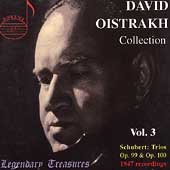| All Artists: Franz [Vienna] Schubert, Lev Oborin Title: David Oistrakh Collection, Vol.3 Members Wishing: 0 Total Copies: 0 Label: Doremi Records Release Date: 11/18/1997 Album Type: Import Genre: Classical Styles: Chamber Music, Historical Periods, Classical (c.1770-1830) Number of Discs: 1 SwapaCD Credits: 1 UPCs: 723723157621, 7237231576216 |
Search - Franz [Vienna] Schubert, Lev Oborin :: David Oistrakh Collection, Vol.3
 | Franz [Vienna] Schubert, Lev Oborin David Oistrakh Collection, Vol.3 Genre: Classical
|
Larger Image |
CD Details |
CD ReviewsBest ever Paul Geffen | 03/01/2001 (5 out of 5 stars) ""One glance at Schubert's Trio [ opus 99 ] -- and the troubles of human existence disappear and all the world is fresh and bright again." - Robert Schumann The two Piano Trios of Franz Schubert are late works, from 1827 and 1828. They are large and complex, and each contains a great deal of lovely material organized in a conventional and sophisticated four-movement structure. They fall somewhere between the two great Quintets in style, between the cheerful lyricism of the Trout and the bottomless pathos of the great String Quintet (surely the greatest and most moving piece of chamber music ever written). In all of these works, the composer requires many things from the performers, including the ability to sustain a singing line, to convey many moods and shades of feeling, and to understand and convey the relationships between the musical elements. In David Oistrakh, Sviatoslav Knushevitsky, and Lev Oborin these demands are met and dealt with in a most convincing, exciting, and aesthetically rewarding manner. At times it is difficult to imagine these spirited and energetic performances in their historical context -- the aftermath of the Second World War and the devastation and suffering of Russia. These performances are lively, a little fast, and very direct, with less of the Viennese charm and sweetness than we usually associate with this composer. The Oistrakh Trio plays with palpable tension and a sense of risk. The Beaux Arts trio, for example, brings a lighter touch to these works. On the whole I feel that the Oistrakh Trio brings out the most that these works have to offer, not always the most pleasant but the most subtle and profound. No performer can match the expressive quality of Oistrakh's playing, and Knushevitsky and Oborin, while not so well known here as soloists, were at the same high level of technique and musicality. The sound is clear mono. It is remarkably good considering the date and the source, a set of Melodiya LPs which were made from a 1947 tape. There is no surface noise or tape hiss unless you listen very closely. This is due in part to the latest computer technology. The producer, Jacob Harnoy, has assembled a formidable array of hardware and software with the aim of extracting as much music as possible from the old discs. He is very successful at this because he has excellent musical instincts and a great deal of patience. Technology alone cannot deliver these results. Some distortion remains, especially in the louder passages. This must have been present on the original tapes and could not have been remedied. Other problems with the source material have been dealt with in other ways: missing notes have been replaced and artificial reverberation has been removed. I could not hear any evidence of the first, while traces of the echo remain as a blurring of the timbres in the Trio, D 898. The sound of the second Trio is not the same as that of the first, with a more constricted feeling, less high end, and a duller sound. It suffers less from distortion, so on balance it is as good. This is also the longest Compact Disc I have ever seen - at nearly 81 minutes it is far over the theoretical maximum for the format. My six-year-old Sony ES player had no trouble tracking it, and neither did a new Panasonic portable. This is the third in a series of early recordings of Oistrakh from DOREMI, and it gives us the best chance yet to hear him when Oistrakh was relatively young. Overall, this is a very valuable release of material of great historical interest and artistic worth."
|

 Track Listings (8) - Disc #1
Track Listings (8) - Disc #1